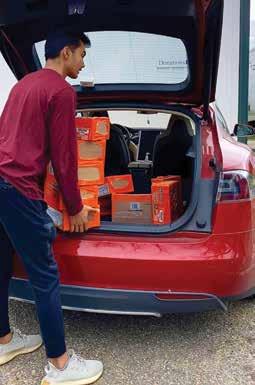Cyber Security Engineering Alumnus Leads Student to Cyber Solutions We all work to protect our personal information, but with today’s technology, our medical devices, such as insulin pumps, are more vulnerable than ever to cyberattacks. Inova Health System information security analyst Matthew Wilkes, BS Cyber Security Engineering ’18, guided two cybersecurity senior design teams in finding solutions to these new problems while preparing them for careers in the field. “These projects were created to challenge engineering students,” says Wilkes. The teams looked at different devices. One examined insulin pumps, which are wirelessly connected to our phones, while the other looked at an infusion pump, which can be wirelessly adjusted. This pump controls the delivery of fluids, such as nutrients and medications, into patients’ bodies. Both teams were tasked with finding vulnerabilities in these devices, pinpointing ways that cyberattackers get into the devices, and coming up with different solutions to protect or monitor cyberattacks. “One big flaw that we predict is that insulin pumps now connect with your cell phones, and that can be extremely exploitive. These products are designed for functionality, not security,” says Evan Simon, a member of one of the teams.
Throughout the year, the students worked with Wilkes to complete their projects. During the spring semester, when classes turned virtual due to the coronavirus, the teams had to quickly adjust how they would reach their goals. “As our second semester started, our team’s main goal was to finish building our prototype and work on testing and improving the product,” says team member Elizabeth McPherson. “After spring break, our team, like many others, faced some challenges in changing to purely virtual communication.” But they harnessed each members’ strengths, adjusted to working virtually, and got the project done. “We didn’t view this as a setback. Regardless of COVID-19, this project has taught us a lot about teamwork, communication, and how to prepare for working challenges that we will face after graduation,” says McPherson. “We’re only human so we will make mistakes, but how do you learn from those mistakes? Have a backup plan if something goes wrong,” says Wilkes. —Ryley McGinnis
Wilkes was part of the first class of cybersecurity graduates from Mason Engineering, and he says it has been a fulfilling experience working with undergraduates at his alma mater. “The students are extremely intelligent, very interactive, and have shown a desire to succeed in the cybersecurity field. They’ve asked intriguing questions and have shown a desire to prove themselves.” Both teams pointed to Wilkes as a crucial guide to navigate their first real-world cybersecurity project. “He tries to push us in the right direction, but he wants us to come up with our own solutions to the problem,” says team member David Nguyen. Since this is new territory in the field, Wilkes wanted to challenge the students to find the best solution so that they are prepared for careers in cybersecurity. “I want to ensure that they’re encouraged to be successful in both their project and beyond. I won’t make it easy for them because if it was easy, every student could do it,” says Wilkes. “Any student who graduates from Mason with a degree in cyber security engineering has very high expectations.” ENGINEERING.GMU.EDU 53






















